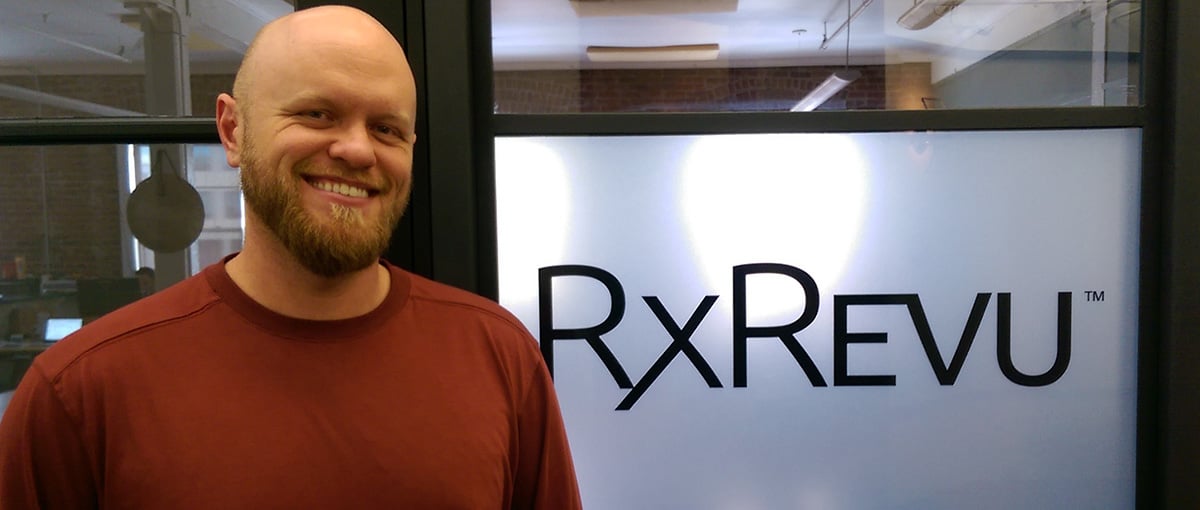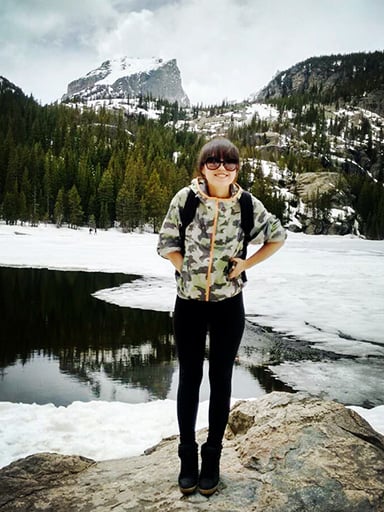 Wes Blakeslee at work at RxREVU
Wes Blakeslee at work at RxREVU
For students who are considering graduate work that will culminate with a PhD, the question is unavoidable: What will I do with my degree?
In some circles, it’s expected that a person with a PhD will teach the next generation of graduate students, perhaps while continuing to do research. While that is sometimes the case, graduate students also have many other ways they can achieve professional success with their degrees.
Wes Blakeslee, PhD, and Rui Xiong, PhD, both hold advanced degrees from the Graduate School at CU Anschutz. Both have gone on to exciting and fulfilling careers outside academia—one in industry and one in government.
Wes Blakeslee
“I considered the classic tenure-track faculty path for a hot second,” Blakeslee said. “But my career aspirations have always been more entrepreneurial, and would only be satisfied by joining a company.”
Today, Blakeslee serves as Director of Clinical Pharmacology at RxREVU, a health information technology company. He believes he was uniquely qualified for the position because he earned a PhD in Pharmacology.
His success at finding a job he “loves” was no accident. As early as his undergraduate days at CU Boulder, he made the decision to take a “gap year” and work in an academic laboratory before heading to graduate school to make sure it was the right next step. He saw two clear hurdles—one, the “five or six years of my life” that it would take to complete his degree. The other was the inherent risks of doing research.
“Research isn’t for everybody,” Blakeslee said. “I had to be sure I had the temperament to handle the ups and downs, knowing that the successes are worth the time you are investing and the failure you will undoubtedly experience.”
That gap year spent working as a professional research assistant helped Blakeslee gauge his appetite for graduate school. Eventually, he “made peace with the hurdles.” He applied to four schools, including CU Anschutz, and discovered during interviews in California, Iowa and Florida that CU Anschutz provided a unique culture for graduate students.
“This is a school with good people and an environment that helps hold your spirits up,” he said. “Academic science is intensely competitive, and here you are surrounded by people who work hard but also know how to enjoy their free time.”
From CU Anschutz to RxREVU
Blakeslee spent his graduate years at CU Anschutz in the School of Medicine laboratory of Timothy McKinsey, PhD, studying the molecular mechanisms of heart failure.
The work in the lab carried important clinical implications, but Blakeslee also started marketing his biomedical skills in the business world outside the Anschutz Medical Campus. Inspired by Associate Dean of the Graduate School Inge Wefes, PhD, and CU Anschutz Emeritus Professor Arlen Meyers, MD, he followed his passion for a career in industry. He met the CEO of RxREVU at a local networking event and “bugged” him until he was brought on as an intern. After he completed his degree, the internship turned into a full-time position.
RxREVU’s Prescription Decision Support tool is a digital platform that enables prescribing providers to see the best and latest cost- and evidence-based information about individual patient’s medications, integrated into electronic health records and directly embedded in the clinical workflow.
“The goal of the platform is to enable every stakeholder to win,” Blakeslee said with undisguised enthusiasm for the start-up company. “Providers can improve outcomes, patients can take control of their own care and ideally have lower out-of-pocket costs, and payers can see greater value in their health plans.”
When Blakeslee started graduate school, he admits he wasn’t sure where he was headed and sometimes asked himself if the investment was a good one. Now he has the answer.
“It was a good investment in my future,” he said. “Someday, I could see myself returning to academia to teach, but that would only be after gaining invaluable experience from my career in industry to help guide the next generation of scientists.”
Rui Xiong
 Rui Xiong
Rui Xiong
Rui Xiong had never even visited the United States before she arrived at the Graduate School at CU Anschutz. Her first impression of this country reflects Colorado’s topography. “There are lots of mountains,” she said. “I like to hike, so I started hiking fourteeners!”
Today, in her position with the National Center for Toxicological Research (NCTR) in Jefferson, Ark., Xiong won’t have local fourteeners to hike, but she has found post-doctoral success and fulfillment working for the United States government.
Xiong’s connection to Denver started in her hometown of Kunming, in southwest China. Kunming and Denver are sister cities, both located at mile-high altitudes. She followed a cousin who was already doing graduate work at CU Anschutz.
While working on her PhD, she did research in the lab of David Ross, PhD, chair of the Department of Pharmaceutical Sciences in the Skaggs School of Pharmacy and Pharmaceutical Sciences. Her research examined the toxicity of environmental relevant quinones. She describes Ross as a “mentor” and “role model” who helped her as she began to consider what her next steps would be after completing her PhD.
“I didn’t think I was ready to teach,” she said. “I wanted to apply my research to real-life problems and have an impact on public health.”
From CU Anschutz to the FDA
The NCTR is the only Food and Drug Administration (FDA) center located outside the Washington, D.C., metropolitan area. There Xiong has joined a cadre of scientists conducting research which generates data for FDA decision-making and develops and supports innovative tools and approaches that the FDA uses to protect and promote individual and public health.
Xiong is doing inhalation-related toxicology studies designed to evaluate tobacco products that may contribute to smoking-related diseases such as chronic obstructive pulmonary disease and lung cancer. She describes the professional environment at NCTR as “friendly and collaborative,” a place where people share their expertise. It is a great place to work, she believes, and it’s a position she earned with the hard work and many years she invested in her PhD studies.
“It’s a good idea to get a PhD,” she said. “I definitely benefited from my graduate training. It made me more logical, a better critical thinker, more mature and more efficient.”
